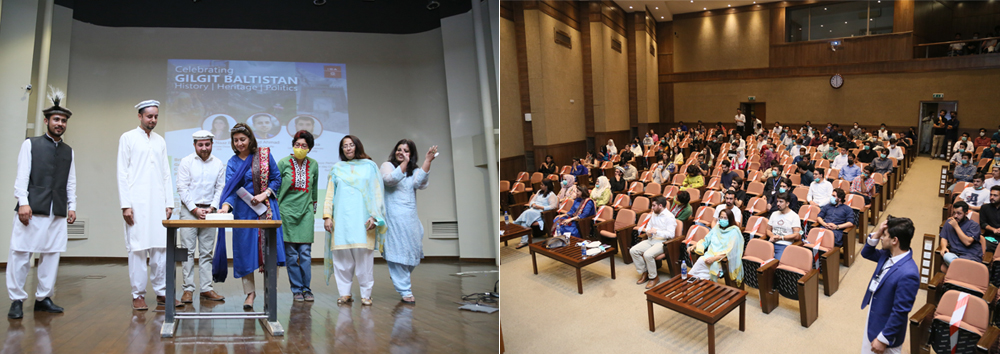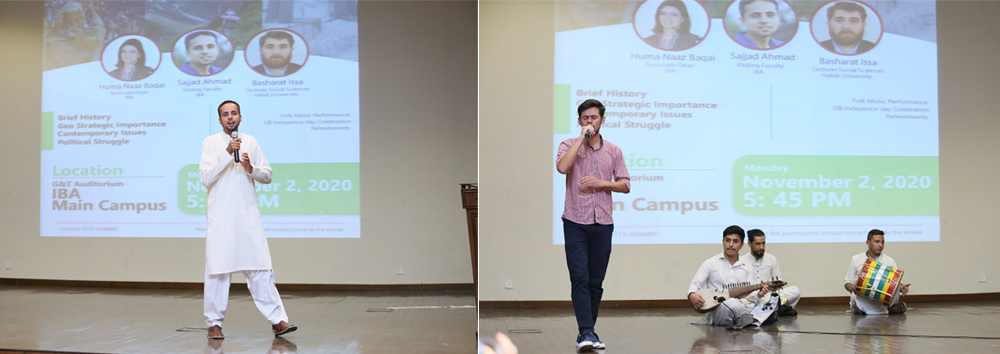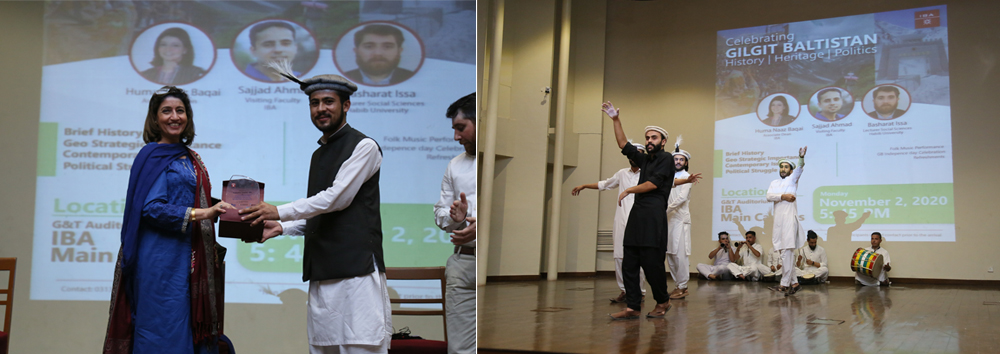Seminar on Heritage and Geostrategic Importance of Gilgit-Baltistan held at IBA Karachi
On 2nd November 2020, students in collaboration with the Social Sciences and Liberal Arts Department at the Institute of Business Administration, Karachi organized a seminar 'Celebrating Gilgit Baltistan: History, Heritage, and Politics'. The event was held to celebrate Gilgit Baltistan's 73rd Independence from the Dojra Raj on 1st November 1947. The aim of this event was to outline the political struggle of the people of Gilgit Baltistan, the often-silenced history of the region, and its culturally rich heritage. The honorable guest speakers included Dr. Huma Naaz Siddiqui Baqai, Mr. Sajjad Ahmad, and Mr. Basharat Issa.
Every year, November 1st is celebrated as Independence Day in Gilgit-Baltistan so the event started with a cake cutting ceremony to officially celebrate the occasion, which was followed by a talk from Mr. Sajjad Ahmad, a visiting faculty member at the Social Science and Liberal Arts Department at IBA. While giving the audience a brief history of the region, he explained that the Gilgiti Scouts (now known as Northern Light Infirmary, a military unit of the Pakistan Army) liberated the region from the Dogra Raj in 1947. "The people's aspiration was to be a part of Pakistan," affirmed Sajjad Ahmed, adding that this was just the start of Gilgit-Baltistan's political struggle. After accusation to Pakistan, the region was administrated under the Frontier Crimes Regulation (FCR) instead of a proper governance structure until 2009. Sajjad Ahmad further elaborated, "It is the 2009 reforms that gave the people of Gilgit Baltistan a political identity, as the official name was changed from Federally Administrated Northern Areas to Gilgit-Baltistan but the struggle to fully integrate into Pakistan goes on to this day." This guest speaker session was followed by a folk music performance by an IBA student, Faizan Arman.
After a refreshing performance, , the Associate Dean at IBA, Dr. Huma Naaz Baqai, spoke to the audience about the geostrategic importance of Gilgit-Baltistan. When speaking about its significance, Huma Naz emphasized, "Today whether it is energy, the pivotal point of connecting the most important regions in the world or your water security, it is because of Gilgit-Baltistan." Dr. Baqai also discussed the recent announcement from the Prime Minister to make Gilgit-Baltistan an interim province and how the region has been historically exploited for political purposes. "Gilgit-Baltistan was heavily exploited during the non-democratic dictatorships, with the most regression during Zia-ul-Haq's regime" explained Dr. Baqai.
The third and final speaker session was given by the respectable Basharat Issa, a native of Gilgit-Baltistan and lecturer at the Habib University in Karachi. Mr. Issa spoke on the political struggle as the region was handed off from the Dogra Raj to being sent under the Federal Crimes Regulation, a "colonial black law" as described by Mr. Issa himself. Speaking about the contemporary issues of the region, he said that the basis of Gilgit-Baltistan's issues is the missing social contract between the government and the local communities. He added that minimal credit for our high literacy rate belongs to the government as most of the progress is by non-government organizations like the Aga Khan Development Network. This heavy dependence on such organizations goes beyond just education. "The government looks towards NGOs to fix everything from roads to water taps in homes," said Mr. Issa, who elaborated that this dependence for the region's development has depoliticized the local people. To further complicate the matters, Gilgit-Balistan's exoticization due to its strategic importance and beauty meant that the authority always remained with the federal government under presidential orders and through the Ministry of GB and AJK. "You can see the videos of Prime Minister's speech in Gilgit in HD, but you see no media coverage of the most peaceful, week-long sit-in Hunza. Gilgit-Baltistan is more censored than other parts of the country," said Mr. Issa while explaining the level of censorship the region faces. There are basic issues of infrastructure, health, power, and higher education. There are no practicing hospitals in Gilgit-Baltistan and no medical or engineering universities. "People of Gilgit-Baltistan are optimistic that their grievances will be given due importance by the Pakistani government," concluded Mr. Basharat Issa.
The event was rounded off with an interactive question-answer session, where members of the audience discussed the issues of Gilgit-Baltistan with the honorable guest speakers.



